Genre Fiction. Page - 287

throne and monarchy of God,
Raised impious war in Heaven and battle proud,
With vain attempt. Him the Almighty Power
Hurled headlong flaming from th' ethereal sky,
With hideous ruin and combustion, down
To bottomless perdition, there to dwell
In adamantine chains and penal fire,
Who durst defy th' Omnipotent to arms.
Nine times the space that measures day and night
To mortal men, he, with his horrid crew,
Lay vanquished, rolling in the fiery gulf,
Confounded, though immortal. But his doom
Reserved him to more wrath; for now the thought
Both of lost happiness and lasting pain
Torments him: round he throws his baleful eyes,
That witnessed huge affliction and dismay,
Mixed with obdurate pride and steadfast hate.
At once, as far as Angels ken, he views
The dismal situation waste and wild.
A dungeon horrible, on all sides round,
As one great furnace flamed; yet from those flames
No light; but rather darkness visible
Served o
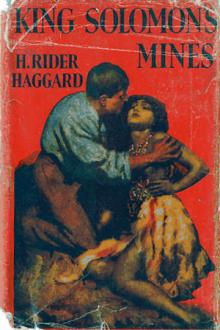
novel. I suppose they--the flights and flourishes--are desirable, and I regret not being able to supply them; but at the same time I cannot help thinking that simple things are always the most impressive, and that books are easier to understand when they are written in plain language, though perhaps I have no right to set up an opinion on such a matter. "A sharp spear," runs the Kukuana saying, "needs no polish"; and on the same principle I venture to hope that a true story, however strange it may be, does not require to be decked out in fine words.
Allan Quatermain.
KING SOLOMON'S MINES
CHAPTER I
I MEET SIR HENRY CURTIS
It is a curious thing that at my age--fifty-five last birthday--I should find myself taking up a pen to try to write a history. I wonder what sort of a history it will be when I have finished it, if ever I come to the end of the trip! I have done a good many things in my life, which seems a long
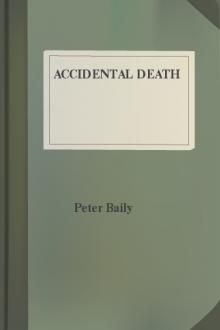
you've got bad luck when future chance events won't go your way. Scientific investigations into this have been inconclusive, but everyone knows that some people are lucky and others aren't. All we've got are hints and glimmers, the fumbling touch of a rudimentary talent. There's the evil eye legend and the Jonah, bad luck bringers. Superstition? Maybe; but ask the insurance companies about accident prones. What's in a name? Call a man unlucky and you're superstitious. Call him accident prone and that's sound business sense. I've said enough.
"All the same, search the space-flight records, talk to the actuaries. When a ship is working perfectly and is operated by a hand-picked crew of highly trained men in perfect condition, how often is it wrecked by a series of silly errors happening one after another in defiance of probability?
"I'll sign off with two thoughts, one depressing and one cheering. A single Chingsi wrecked our ship and our launch. What could a whole planetful of them do?

ship, or meddling in affairs that don't concern you you can take the consequences, and be damned. I don't care whether you are an English lord or not. I'm captain of this here ship, and from now on you keep your meddling nose out of my business."
The captain had worked himself up to such a frenzy of rage that he was fairly purple of face, and he shrieked the last words at the top of his voice, emphasizing his remarks by a loud thumping of the table with one huge fist, and shaking the other in Clayton's face.
Greystoke never turned a hair, but stood eying the excited man with level gaze.
"Captain Billings," he drawled finally, "if you will pardon my candor, I might remark that you are something of an ass."
Whereupon he turned and left the captain with the same indifferent ease that was habitual with him, and which was more surely calculated to raise the ire of a man of Billings' class than a torrent of invective.
So, whereas the captain might easily have been brought to regr
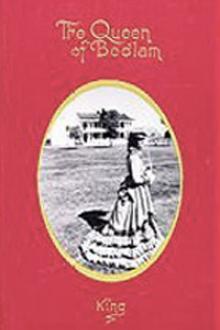
he doctor, bending down over her as they were walking home. "It isn't like you, Nell, to be censorious. What's she been doing?--making eyes at young McLean?"
He might have judged better than that, had he reflected an instant. He never yet had thought of his daughter except as a mere child, and he did not mean for an instant to intimate that her growing interest in the young lieutenant was anything more than a "school-girl" fancy. She was old enough, however, to take his thoughtless speech au sérieux, and it hurt her.
"Papa!" was her one, indignant word of remonstrance. She would not even defend herself against such accusation.
"I know!--I understand--I didn't mean it except as the merest joke, my child," he hurriedly interposed. "I thought you'd laugh at the idea."
But she would not speak of it, and he quickly sought to change the subject, never even asking other reason for her apparent aversion to Miss Forrest. It was true that the speedy coming of Dr. and Mrs. Gra

a corresponding sneer--the hour for parting came; and the grief of that moment was considerably lessened by the admirable discourse which Miss Pinkerton addressed to her pupil. Not that the parting speech caused Amelia to philosophise, or that it armed her in any way with a calmness, the result of argument; but it was intolerably dull, pompous, and tedious; and having the fear of her schoolmistress greatly before her eyes, Miss Sedley did not venture, in her presence, to give way to any ebullitions of private grief. A seed-cake and a bottle of wine were produced in the drawing-room, as on the solemn occasions of the visits of parents, and these refreshments being partaken of, Miss Sedley was at liberty to depart.
"You'll go in and say good-by to Miss Pinkerton, Becky!" said Miss Jemima to a young lady of whom nobody took any notice, and who was coming downstairs with her own bandbox.
"I suppose I must," said Miss Sharp calmly, and much to the wonder of Miss Jemima; and the latter having knocked

rtune. Sister Theresa wheedled large sums out of him, and he spent, as you will see, a small fortune on the house at Annandale without finishing it. It wasn't a cheap proposition, and in its unfinished condition it is practically valueless. You must know that Mr. Glenarm gave away a great deal of money in his lifetime. Moreover, he established your father. You know what he left--it was not a small fortune as those things are reckoned."
I was restless under this recital. My father's estate had been of respectable size, and I had dissipated the whole of it. My conscience pricked me as I recalled an item of forty thousand dollars that I had spent--somewhat grandly--on an expedition that I led, with considerable satisfaction to myself, at least, through the Sudan. But Pickering's words amazed me.
"Let me understand you," I said, bending toward him. "My grandfather was supposed to be rich, and yet you tell me you find little property. Sister Theresa got money from him to help build a school. How much
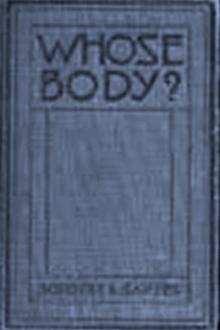
wer to the description of any they'd had."
"Nor to the description of any of the patients, I hope," suggested Lord Peter casually.
At this grisly hint Mr. Thipps turned pale.
"I didn't hear Inspector Sugg enquire," he said, with some agitation. "What a very horrid thing that would be--God bless my soul, my lord, I never thought of it."
"Well, if they had missed a patient they'd probably have discovered it by now," said Lord Peter. "Let's have a look at this one."
He screwed his monocle into his eye, adding: "I see you're troubled here with the soot blowing in. Beastly nuisance, ain't it? I get it, too--spoils all my books, you know. Here, don't you trouble, if you don't care about lookin' at it."
He took from Mr. Thipps's hesitating hand the sheet which had been flung over the bath, and turned it back.
The body which lay in the bath was that of a tall, stout man of about fifty. The hair, which was thick and black and naturally curly, had been cut and parted by

rionette and, what is much worse, you have a woodenhead."
At these last words, Pinocchio jumped up in a fury, took a hammer fromthe bench, and threw it with all his strength at the Talking Cricket.
Perhaps he did not think he would strike it. But, sad to relate, my dearchildren, he did hit the Cricket, straight on its head.
With a last weak "cri-cri-cri" the poor Cricket fell from the wall,dead!
CHAPTER 5
Pinocchio is hungry and looks for an egg to cook himself an omelet; but,to his surprise, the omelet flies out of the window.
If the Cricket's death scared Pinocchio at all, it was only for a veryfew moments. For, as night came on, a queer, empty feeling at the pit ofhis stomach reminded the Marionette that he had eaten nothing as yet.
A boy's appetite grows very fast, and in a few moments the queer, emptyfeeling had become hunger, and the hunger grew bigger and bigger, untilsoon he was as ravenous as a bear.
Poor Pinocchio ran to the fire
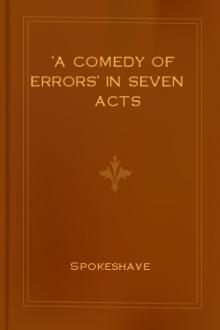
e land.
_Quezox:_ But, noble Francos, we now wend our wayTo meet the vermin which do suck our blood,And they with tongues which serpent-like can charmMay fool thee with their tales of dire intent.
_Francos: (striking his breast):_
Fear not, they soon shall feel how vain it were
To seek to trick one who, in halls of state,
Hath met the wiles of shrewd, self-seeking men,
But to ward off attack with virtue's shield.
_Captain and Seldonskip approach._
_Captain:_ Most noble potentate, as I my rounds
Of observation make, it pleasures me
Most mightily, to make obeisance to
The one so honored by his native land.
As captain of a vessel may be judged
By those subordinate to his command,
So do I quick conception of thee form.
By the broad mental gifts of Seldonskip
Who were the hose, through which thy mind doth squirt Most sapient thought, for mankind's betterment.
_Seldonskip:_ You bet his